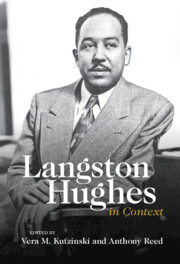Book contents
- Langston Hughes in Context
- Langston Hughes in Context
- Copyright page
- Contents
- Contributors
- Abbreviations
- Introduction
- Part I Singing America
- Chapter 1 Langston Hughes, Chicago, and Modernism
- Chapter 2 Jazz, Performance, and Modernist Embodiment in Langston Hughes’s Early Writing
- Chapter 3 His Ways with White Folks
- Chapter 4 Love at a Distance in Selected Letters by Langston and Carrie Hughes
- Chapter 5 Langston Hughes’s 1930s Short Fiction
- Chapter 6 Langston Hughes and Simple
- Chapter 7 Langston Hughes’s Famous Books, Ebony Magazine, and the Politics of Civil Rights in Biographies for the Young
- Chapter 8 Rural Black Masculinity and the Blues in Not without Laughter
- Chapter 9 From the Sublime to the Grotesque
- Chapter 10 Coalitional Aesthetics
- Chapter 11 Langston Hughes’s Translingual Poetics and Pedagogy
- Part II The Global Langston Hughes
- Part III Afterlives
- Index
Chapter 1 - Langston Hughes, Chicago, and Modernism
from Part I - Singing America
Published online by Cambridge University Press: 10 November 2022
- Langston Hughes in Context
- Langston Hughes in Context
- Copyright page
- Contents
- Contributors
- Abbreviations
- Introduction
- Part I Singing America
- Chapter 1 Langston Hughes, Chicago, and Modernism
- Chapter 2 Jazz, Performance, and Modernist Embodiment in Langston Hughes’s Early Writing
- Chapter 3 His Ways with White Folks
- Chapter 4 Love at a Distance in Selected Letters by Langston and Carrie Hughes
- Chapter 5 Langston Hughes’s 1930s Short Fiction
- Chapter 6 Langston Hughes and Simple
- Chapter 7 Langston Hughes’s Famous Books, Ebony Magazine, and the Politics of Civil Rights in Biographies for the Young
- Chapter 8 Rural Black Masculinity and the Blues in Not without Laughter
- Chapter 9 From the Sublime to the Grotesque
- Chapter 10 Coalitional Aesthetics
- Chapter 11 Langston Hughes’s Translingual Poetics and Pedagogy
- Part II The Global Langston Hughes
- Part III Afterlives
- Index
Summary
Langston Hughes’s association with Chicago as a nexus for modernism was clearly marked in 1926, when he published four poems in Harriet Monroe’s Poetry: A Magazine of Verse, a leading journal for avant-garde poetry in the English-speaking world. This analysis considers how geocultural contexts in Chicago figured in the development of Hughes’s engagements with modernism. Examining Hughes’s jazz and blues poetry of the 1920s in light of his response to formal innovations by Chicago Renaissance poets such as Carl Sandburg as well as “high” modernists such as T. S. Eliot, I also explore how his critical engagement with Ezra Pound’s imagist poetics was shaped by the prior examples of Sandburg and Jean Toomer, and conclude with a discussion of how Hughes’s literary collaboration with Chicago luminaries such as Richard Wright and his mentorship of Gwendolyn Brooks played an important role in the creative flowering of the Black Chicago Renaissance.
- Type
- Chapter
- Information
- Langston Hughes in Context , pp. 11 - 20Publisher: Cambridge University PressPrint publication year: 2022

